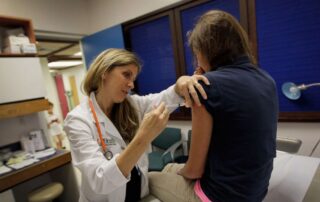HPV vaccine leads to more than 80% drop in infections: What parents need to know
Source: Good Morning, America Date: April 2nd, 2021 Author: Katie Kindelan A new study has shown the effectiveness of the HPV vaccine, and found a dramatic decline in human papillomavirus infections in both vaccinated and unvaccinated teen girls and young women in the United States. "This study shows that the vaccine works very well against a common virus, HPV," Dr. Hannah Rosenblum, lead author of the study and medical epidemiologist at the Centers for Disease Control and Prevention (CDC), told "Good Morning America." "HPV can cause serious health problems later in life, including some cancers in both women and men," she said. "HPV vaccination is cancer prevention -- by vaccinating children at age 11 or 12, we can protect them from developing cancers later in life." HPV is the most common sexually transmitted infection in the United States and can cause health problems like genital warts in addition to cancer, which are most commonly cervical cancer in women and throat cancer in men, according to the CDC. The HPV vaccine was first authorized in the U.S. for females in 2006, and for males in 2011. There has since been a more than 80% decline in HPV infections nationally, according to the CDC study. The newly-released data from the CDC shows an 88% decrease in HPV infections among 14 to 19-year-old females and an 81% decrease among 20 to 24-year-old females. There has also been a drop in unvaccinated females, according to Rosenblum, who warned that does not mean people [...]

